-
Paper Information
- Paper Submission
-
Journal Information
- About This Journal
- Editorial Board
- Current Issue
- Archive
- Author Guidelines
- Contact Us
American Journal of Sociological Research
p-ISSN: 2166-5443 e-ISSN: 2166-5451
2023; 13(1): 12-23
doi:10.5923/j.sociology.20231301.03
Received: Dec. 23, 2022; Accepted: Feb. 10, 2023; Published: Mar. 28, 2023

Misuse of Technology to Exacerbate Democracy in Crisis
Md Rahimullah Miah1, Md Mehedi Hasan2, Jorin Tasnim Parisha3, Shahriar Hussain Chowdhury4, Alexander Kiew Sayok5
1Department of IT in Health, North East Medical College, Affiliated with Sylhet Medical University, Sylhet, Bangladesh; and PhD Awardee, IBEC, Universiti Malaysia Sarawak (UNIMAS), Malaysia
2Department of Law, Green University of Bangladesh, Dhaka, Bangladesh
3Government Satis Chandra Girls’ High School, Sunamganj Sadar, Sunamganj, Bangladesh
4Department of Dermatology, North East Medical College and Hospital, Affiliated with Sylhet Medical University, Sylhet, Bangladesh
5IBEC, Universiti Malaysia Sarawak, Kota Samarahan, Sarawak, Malaysia
Correspondence to: Md Rahimullah Miah, Department of IT in Health, North East Medical College, Affiliated with Sylhet Medical University, Sylhet, Bangladesh; and PhD Awardee, IBEC, Universiti Malaysia Sarawak (UNIMAS), Malaysia.
| Email: |  |
Copyright © 2023 The Author(s). Published by Scientific & Academic Publishing.
This work is licensed under the Creative Commons Attribution International License (CC BY).
http://creativecommons.org/licenses/by/4.0/

Today’s global democracy is in crisis due to abuse of advanced wireless sensor technology. Everyone uses this technology for fulfillment of democratic activities but no one knows its effect with fluctuated radio frequencies in humans due to presence of active open-eyes, self-voice, switch-on sensor device and a specific GPS location. Cyber criminals misuse this sensor device towards political leaders as a weapon of political agenda through misusing of biosensor cloud networks worldwide. This unexpected sensor device is a tactical shock as the extreme threat to the constitutional laws and orders exacerbate the guarantee of free and fair elections, freedom of the press, religious sentiments, the rights of minorities, national security, global integrity and the rule of laws. The research conducted in individuals with body mass indices at the positions of global positioning systems with tracking through the processed radio frequencies at dark and light environments. The study details the principles, recognizing the impact of digital poisoning with individuals suffering in pandemic political diseases worldwide. Qualitative and quantitative political data collected from ISNAH experiment and field survey while secondary data obtained from miscellaneous sources. The study shows the interruption of a comprehensive global economy, human rights, political relations, and public health security due to active constitutional democracy. The research also demonstrates that political leaders are getting sick and later suffering depressions and political anxiety, which reflects in national, regional and global democracy. Global politicians and general people are running towards loss in diverse ways with democratic surroundings through tracking and digital poisoning from advanced technology. These findings reflect the global democracy that the democratic governments provide in the State within the constitution. Democratic technological awareness is essential but such consciousness is below par among supporters. The study suggests future research trajectories of a new alternative approach to drive the democratic agenda in legal ways to further incorporate the secure technology for settlement of stable political rights.
Keywords: Democracy, Technology, Government, Supporter, Constitution, State
Cite this paper: Md Rahimullah Miah, Md Mehedi Hasan, Jorin Tasnim Parisha, Shahriar Hussain Chowdhury, Alexander Kiew Sayok, Misuse of Technology to Exacerbate Democracy in Crisis, American Journal of Sociological Research, Vol. 13 No. 1, 2023, pp. 12-23. doi: 10.5923/j.sociology.20231301.03.
Article Outline
1. Introduction
- In today's world mobile technology and people are deeply involved [1]. They are adorned with each other, and are rooted in happiness, sorrow, joy and pain, whose roots are deeply rooted. Human-beings are is the best-working quality of human creation [2]. By virtue of good deeds man is the best creature in creation and by virtue of evil deeds he is the worst creature in creation. Creator (Allah) creates this man in the world with all kinds of faults and virtues for a moment. In this short period of time, misdeeds are spreading all over the world. And there is an effect of delusion among people. There is despair everywhere, some servants of Allah are worried, again shocked. Why this frustration? Why this misery with us? What happened to our habitable world? Why so many buses, trains, planes, building accidents or sudden wildfires? Even cyclones, tsunamis, earthquakes, flash flood and untimely frequent rains? Why is a country at war with another country? Why are people losing their right to vote in national elections? Why are the targeted people kidnapped? Through research, the answer to these questions is that the main reason for this incident is the misuse of wireless sensor technology [1].People live in digital world [1]. In this age no one lives a single moment without technology. Hence, advanced wireless sensor technology has brought the entire world within the reach of information-sharing and communication [3]. Politicians talk about democracy, human rights activists are united, but freedom of speech is stifled in the flow of information [4]. On the other hand, cyber criminals of the underworld are active in misusing advanced technology [5]. Different countries of the world are facing threats in the establishment of human rights and democracy [6]. Lacking the security of the right technologies, the digital age has brought new challenges to the protection of human rights and democracy [7]. Although people are comfortable using technology, many are not aware of its misuse [8]. This study details the impact of technology on democracy. Politicians, researchers and policy makers need not look far to see indicators of regression [9]. But the misuse of artificial intelligence by cyber criminals has brought the entire human race to the brink of destruction today [10]. Helpless people are crying out for democracy and human rights. Someone is listening to that scream, and someone is pretending not to hear it. Some people are giving wrong support on social media as compensation.
2. Materials and Method
- The study was followed diverse materials and methods, which are illustrated as below.
2.1. Data and Sample Size
- Materials and Methods followed in the following URLs for data collection:URL: http://article.sapub.org/10.5923.j.ijas.20211102.02.html URL: http://article.sapub.org/10.5923.j.ajbe.20201001.03.htmlURL: http://article.sapub.org/10.5923.j.fs.20211101.01.html URL: https://ojs.bilpublishing.com/index.php/jer/article/view/2826/2632 URL: http://article.sapub.org/10.5923.j.diabetes.20200902.02.html URL: http://article.sapub.org/10.5923.j.ijvmb.20211001.03.html URL: http://article.sapub.org/10.5923.j.scit.20211101.02.html URL: http://article.sapub.org/10.5923.j.geo.20211101.02.html URL: http://article.sapub.org/10.5923.j.bioinformatics.20211101.01.html URL: http://article.sapub.org/10.5923.j.env.20211102.01.html URL: https://ccsenet.org/journal/index.php/gjhs/article/view/0/46717 URL: http://article.sapub.org/10.5923.j.ijim.20221101.01.html URL: https://ccsenet.org/journal/index.php/jpl/article/view/0/47787 Qualitative and quantitative democracy data were collected through:ο a. field survey, observation, interviews, informal contact on the innovative technological users towards politicians, human right activist, individuals and administrations with diverse services.ο b. Secondary data were obtained from different sources.Tracking Processes at a fixed GPS position and open active eyesο i. One to one tracking with node sensors at a particular GPS locationο ii. One to many tracking with central sensors at democratic place assemblyο iii. Many to many with distributed sensors at human right rally and gathering places.
2.2. ISNAH Procedure
- ISNAH- Impact of Sensor Networks towards Animals and Human beings [1,11]. The study followed different steps, which as shown in Figure 1.
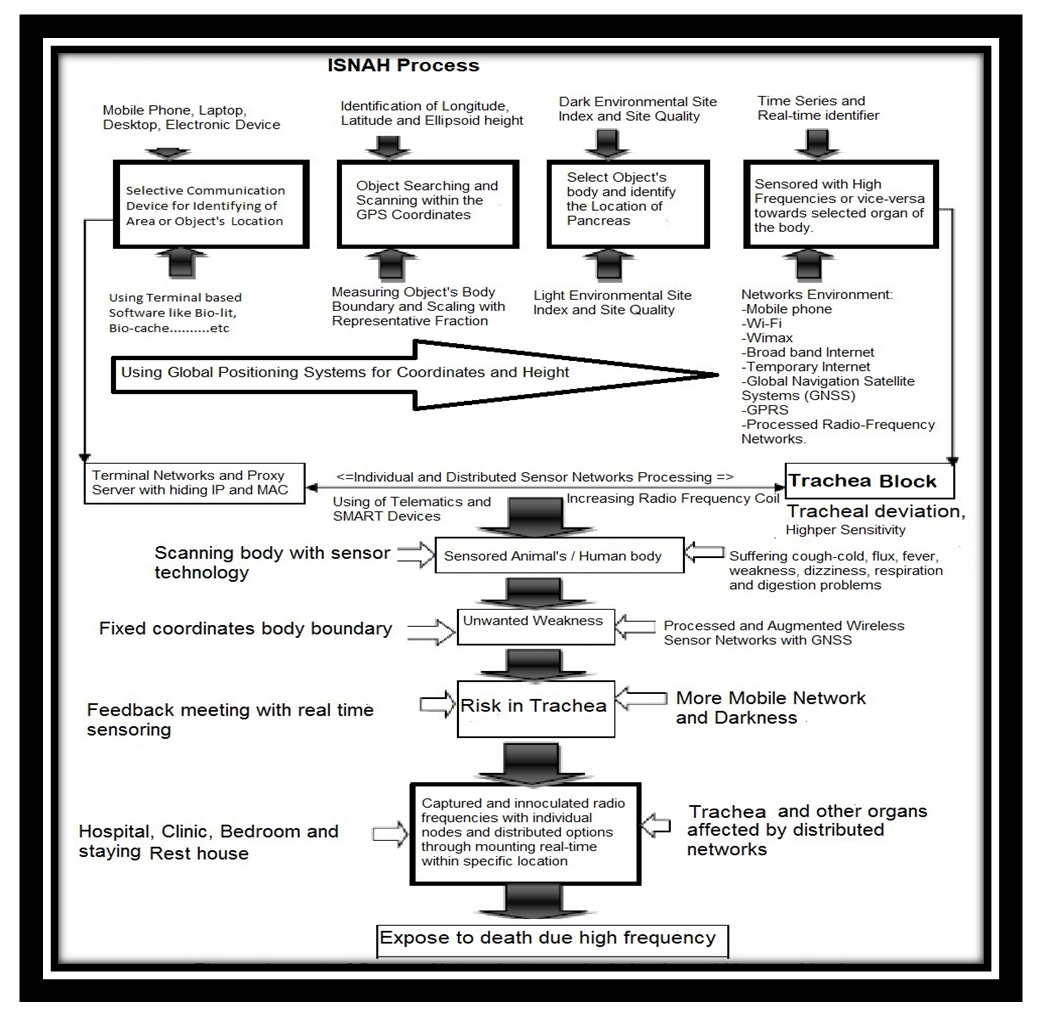 | Figure 1. Procedure of ISNAH towards doctors and patients [1] |
2.3. Data Compilation
- All quantitative and qualitative related democratic data were collected and compiled according to research objectives.
2.4. Data Analysis and Interpretation
- The compiled data checked for accuracy from various sources are also verified for the preparation of master sheet for analysis and interpretation using updated software like MS Office 2021, R ver. 3.6 and SPSS ver.29.
3. Results
3.1. Deterioration of Democratic Values
- The study showed the deterioration democratic values, violence of human rights, constitutional rights and people’s well-being due to misuse of advanced wireless sensor technology, which as illustrated as below: i. Online hate towards democratic leader and politiciansii. Digital offensive speechiii. Virtual brain iv. Sexual harassmentv. Top leader arresting due to bounce messagevi. Kidnapping and traffickingvii. Sudden sickviii. Digital poisoning at political fieldix. Share disinformationx. Infodemicxi. Digital attackingxii. Digital nonsense wordsxiii. Digitally paralyzedxiv. Digital killing
3.2. Violence of Human Rights
- The study is being propagated to the political leaders and supporters at an accelerated pace through the misuse of wireless sensor technology. The study also revealed that policy-makers, researchers, journalists, politicians, scientists and human rights defenders face constant surveillance and frequent online attacks, digital sudden illnesses and unexpected extrajudicial deaths by cybercriminals. And cybercriminals are posting on social media about natural deaths. There are several digital tracking towards politicians, which as shown in Figure 2.
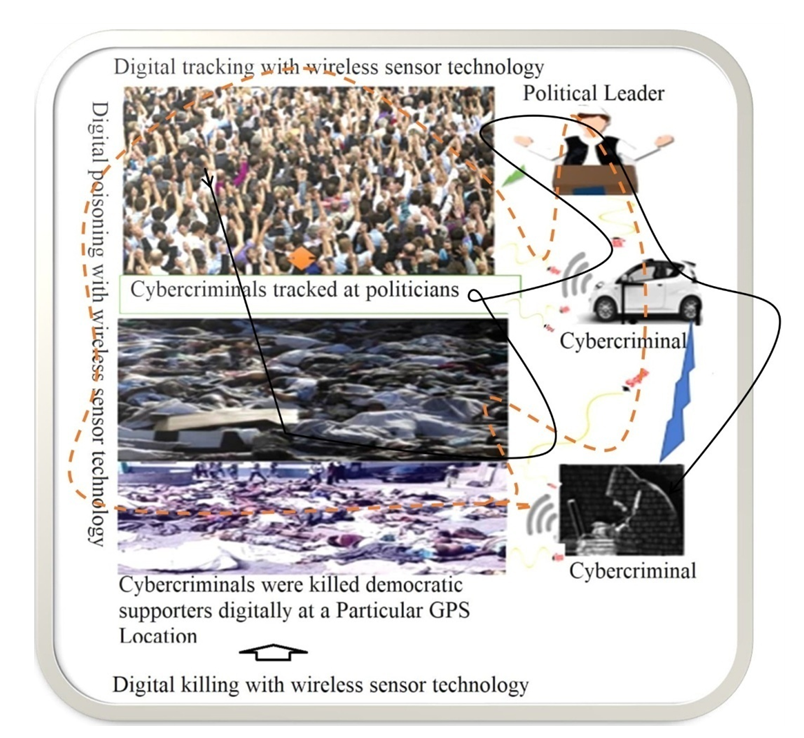 | Figure 2. Digital Tracking at Political meeting with wireless sensor device |
3.3. Political Target-Oriented Diseases
- Research showed politicians are anguishing due to misuse of advanced wireless sensor technology. The study identified various digital tracking to create political diseases, which as shown in Figure 3. These diseases include Covid-19, Sudden Cardiac Arrest, Acute Respiratory Distress Syndrome (ARDS), Liver Cirrhosis, Chronic Kidney Disease (CKD), Stroke, Liver Cancer, Back pain, Diabetes, Tracheal disorder, Colorectal Cancer, Dermal diseases, particularly Tinea corporis, Scabies, Acne etc.
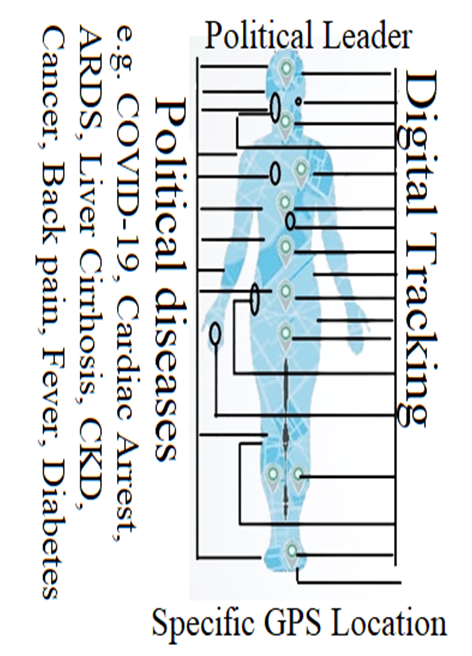 | Figure 3. Different political diseases due to digital tracking at a particular GPS location |
3.4. Constitutional Violence
- When a citizen protests and criticizes injustice, cybercriminals attack and injure him, at one point even make him sick through wireless sensor tracking and digitally kill him again through sensor tracking. And these incidents have now become normal in different countries of the world, the violence of cyber criminals has increased. Those who stifle free expression are often above the law. Cybercriminals make deals with political parties subject to undesirable conditions, for example - cybercriminals will win the political party in national elections by various means, and cybercriminals will control administrative functions, and cybercriminals will torture, disappear and kill some people. But an elected government cannot prosecute cyber criminals. As a result, those who express their views are attacked and, in many cases, criminal cases are filed against cybercriminals. Instead of taking action, the administration and the police are playing the role of silent spectators, giving excuses for the long process of police investigation, which as shown in Figure 4. Studies show that if the use of secure wireless sensor technology is ensured, the citizens of the world will wake up, the language of protest will be more active and injustice-injustice-tyranny will be removed from the world, but that day is not far away. So far, the general public is very aware, vocal and united. As a result of proper initiatives against political corruption, democracy will return to various countries and peace will be established in the world.
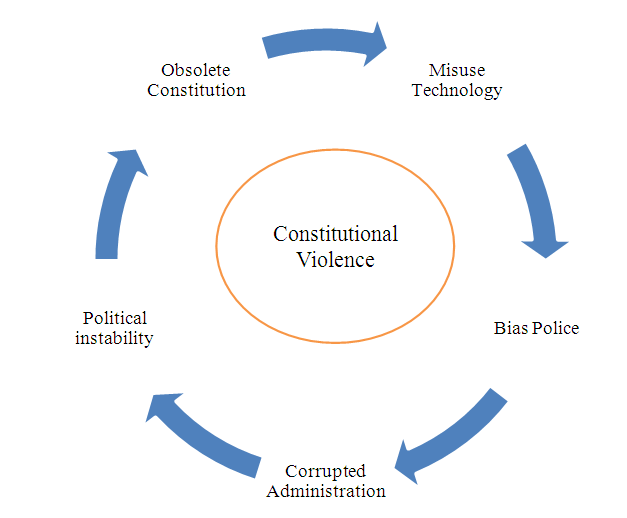 | Figure 4. Constitutional Violence due to misuse of advanced wireless sensor technology |
3.5. Exacerbating on People’s Well-being
- The study showed the barrier of people’s well being due to misuse of advanced wireless technology. The study also interpreted that countries around the world go bankrupt if the country's experts fail to correctly diagnose the misuse of advanced technology. As a result, the citizens of that country continue to live in a bankrupt country and the common people suffer from democracy. Because some national politicians are in cahoots with cybercriminals—who are involved in national and international partisan cycles, tech-incompetent bureaucracies, politicians dependent on insecure technologies, unscrupulous cyber-businessmen, and members of social media controlled by global cyber-criminals—all are directly and indirectly responsible. The solution to this problem lies with senior politicians, skilled technicians and policy-makers within the country - but it can be solved with the help of international donor agencies.
3.6. Misuse of Legal Action
- The study showed that 1029 accused have been identified in Digital Security Act cases. Out of them, politicians were 301, journalists 280, students 106 and teachers 51, which as shown in Figure 5.
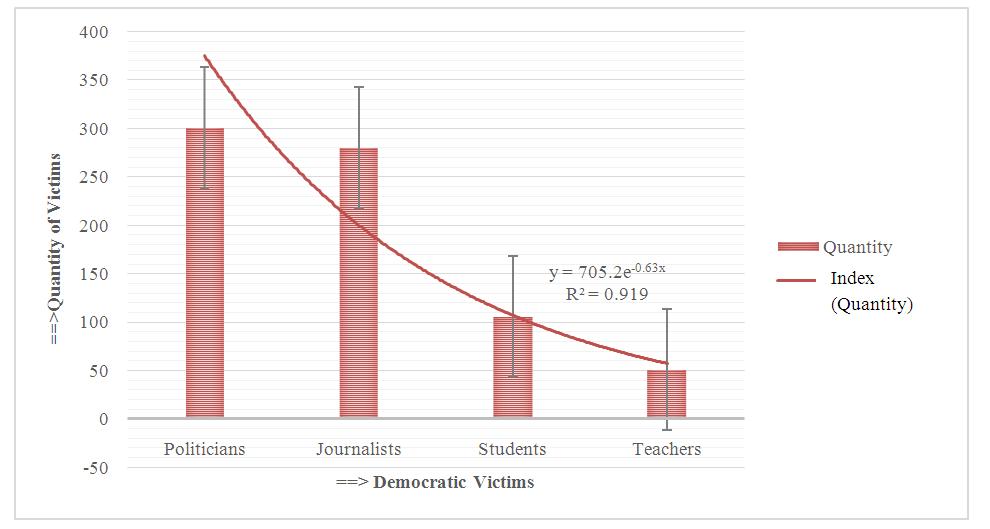 | Figure 5. Democratic Victims due to misuse of policy and technology |
3.7. Ignoring Fundamental Right
- The study showed that the total of 698 cases were focused on Facebook phenomena. Out of them, harassment cases were 76, financial fraud 44, religious contempt 115 and political cases 463, which as shown in Figure 6.
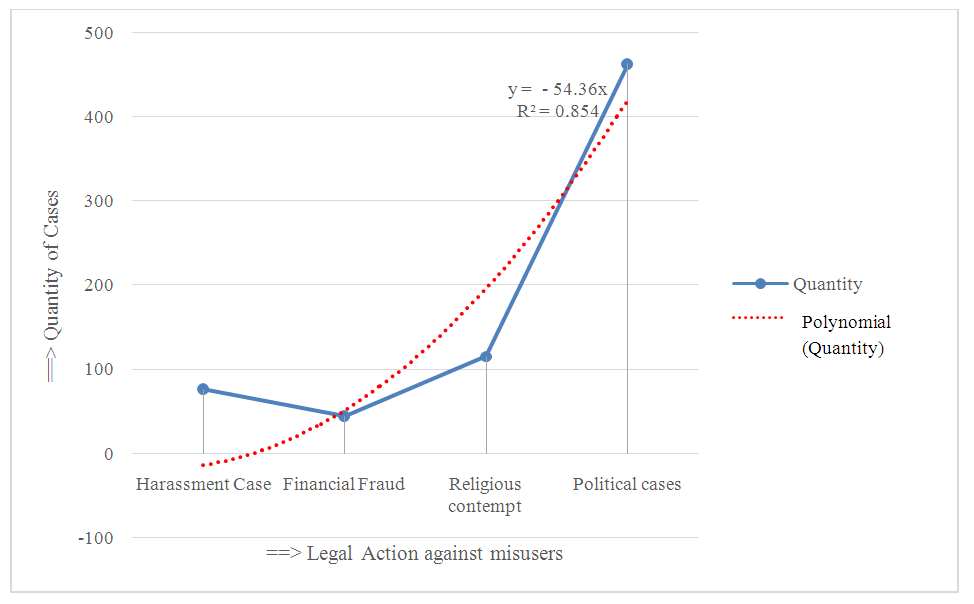 | Figure 6. Legal Action due to misuse of social media |
4. Discussion
- Research shows politicians are suffering from misuse of sensor technology and concerns are growing [12]. For them to answer this concern is extremely challenging, given the uncertainty of secure technologies and the opacity of ruling political parties, as communications regulation always poses a risk to the protection of freedom of expression [13]. Several countries around the world have adopted or are considering new laws on social media exposure [14]. Many of these regulations are problematic, imposing restrictions that exceed and undermine fundamental rights [15]. The number of wireless networks, broadband internet and media outages is also increasing across the world, including Europe [16]. As few countries in the rest of the world follow such measures, these worrying trends have serious implications for politicians, making it more important than ever to protect human rights and democratic space in the digital age [17]. The researcher has identified three key elements that are essential to ensuring progress in this direction, namely: (1) Protecting our right to participate is central to protecting democracy. (2) civil society plays a key role for democracy – it must be meaningfully involved in the development of adequate policies, regulations, security assurances and other measures related to safe digital technologies and online spaces, and (3) journalists, researchers, scientists and civil society actors There must be open and secure access to online spaces, free from surveillance and censorship. States and online organizations have a responsibility to ensure this and ensure collective support should threats arise. The right to freedom of expression must be preserved for all online and offline through safe user-friendly networks and go hand-in-hand with tackling online hate speech and misinformation. With social media providing unique opportunities to connect with others and drive public debate, political leaders are aware of the lack of effectiveness of companies to respond to users' concerns, their opacity and problematic power dominance, as well as government failures. This space rights-respect regulations. Crucially, any measures adopted by social media companies and states to regulate speech must respond to safe technology guarantees based on adequate principles of legality, necessity and proportionality. The world faces the unexpected recession due to political instability, pandemic and Russia-Ukraine war. One-third of the world's countries will be hit by recession in the new year, which will affect the whole world [20,21,22,23,24]. The World Conference on Democracy, held by various countries, looks at progress and future challenges in meeting five goals—denying authoritarian governments, fighting corruption, using advanced wireless sensor technology, upholding human rights and truly safe social media exposure.
4.1. Creating Environment of Fear
- The Digital Security Act has succeeded in creating an atmosphere of fear in society for expressing opinions [25]. Government people are filing an average of four cases per month under this law. Statistics from the last four years show that digital security laws have been misused in the country. Digital Security Act cases, identity of accused, arrests, detainees and identity of litigants, Digital Security Act was intended to create an atmosphere of fear. By this arrangement is made that everyone is in constant fear and does not protest. According to the research sources, the investigation report is supposed to be submitted within 60 days in this law. 15 days can be extended if required. But in many cases investigation report is not submitted within 75 days. The accused are detained for a long time before the trial. 26 juveniles under the age of 18 have been charged under this Act in the last 4 years. 1 thousand 109 cases have been filed in 4 years under Digital Security Act. Accused in these cases are 2 thousand 889 people. Among them, 1 thousand 119 people have been detained, that is, 38.74 percent of the total accused have been detained. But this information is not a complete picture of the case. Law enforcement agencies do not want to release details of the case. 1 thousand 29 accused have been identified in Digital Security Act cases. However, the arrest rate of students is higher than other accused. 71 percent of the total accused students were detained. According to the survey, 140 cases have been registered under the Digital Security Act for insulting the Prime Minister. Out of 210 accused in these cases, 115 have been arrested. Most of the plaintiffs in Digital Security Act lawsuits accusing politicians of defamation are their supporters. Research shows that digital security laws have been used to silence people's voices on social media, including Facebook. An average of 9 cases per month against expression of opinion on Facebook. A total of 698 cases were focused on Facebook. Research shows that digital security laws have become a sword for journalists. Regional journalists are particularly at risk. In 2020, the Act saw the highest number of cases filed against journalists. Law enforcement agencies and government officials file an average of four cases per month under the Digital Security Act. Cases are raised under Sections 25, 29, 31 and 35 of the Act. The court also questioned whether Articles 25 and 31 conflicted with the country's constitution. Research shows that over the past four years, digital security laws have been abused more than enforced. The deliberate use of non-bailable clauses has increased. Progressive parties are more affected by this law. The victims claim that the Digital Security Act should be repealed immediately. Studies have shown that this law is not meant to protect people's rights, but to oppress common people. Hate speech, state security laws need to be reformed. The Act lacks much needed definition. Journalist Masood Kamal commented that the Digital Security Act is an evil law. He said, the purpose of this law was to spread panic everywhere. The law does not apply to a certain group of society like police, law enforcement, administration and ministers. Bangladesh Human Rights Foundation Chairman Elina Khan said that the Digital Security Act has been used as a tool of repression. Once Section 54 of the Criminal Procedure Code was misused, it got a new shape in the Digital Security Act. Statistics show that human rights activists, journalists—all are at risk. Zillur Rahman, executive director of Center for Governance Studies (CGS), said that there is a crisis of democracy, human rights, rule of law and freedom of speech in the country. The Digital Security Act has further established the fear that has prevailed for a long time. The accused in most of the cases have been hanging for a long time. The Digital Security Act has succeeded in creating fear among people. The law does not apply against the politically powerful. Under the umbrella of the ruling party, cyber criminals misuse information technology to cause national and international damage and impunity common people, which is against the constitution.
4.2. Fundamental Clauses of the Constitution and Democracy
- A constitution is a law like any other general or special law of the land [19]. However, a general or special law differs from the constitution in that it is the supreme law of the land, the procedure for amending this law is different from that of a general law or special law and if it conflicts with any general or special law. Constitution, Constitution prevails. Amendment of laws in all countries of the world, be it constitutions or general or special laws, is an ongoing process. Amendment of law in any dynamic society especially if the constitution or any of its provisions are made unamendable cannot meet the needs of time and era in view of changing society. Therefore, the democratic countries of the world did not prevent the amendment of the constitution or any of its clauses despite creating complications. Article 142 of our Constitution elaborates on the power to amend the provisions of the Constitution. Article 142 of the Constitution has been amended twice by the Second and Twelfth Amendment Acts and once by the Second Proclamation (Fifteenth Amendment) Order by a total of three amendments. Article 142 was last substituted by the Fifteenth Constitution Amendment Act. The position of Article 142 in the Constitution of 1972, which provided from time to time— notwithstanding anything contained in that Constitution, (a) any provision of this Constitution may be amended or repealed by an Act of Parliament; Provided that, (a) no bill for such amendment or repeal shall be taken up for consideration unless the full title of the bill expressly states that any provision of this Constitution shall be amended or repealed; (a) no such bill shall be submitted to the President for assent by a vote of two-thirds of the total number of members of Parliament; (b) after a bill has been passed in the above manner, if it is presented to the President for assent, he shall give his assent within seven days of the presentation of the bill; and if he is unable to do so, he shall be deemed to have assented to the bill after the expiry of the said period.By the Second Constitution Amendment Act, in sub-section (a) for the words 'amended or repealed' the words 'addition, alteration or substitution' were substituted. By the above amendment, in clause (a) of sub-section (a), the words 'amendment or repeal' shall be substituted by the word 'amendment' and the words 'or repeal' appearing after the word 'amendment' shall be deleted from the same clause. By the above amendment clause (2) was inserted in section 142 that nothing in section 26 shall apply to any amendment made under that section. Further, by the above amendment, section 142 has been renumbered as clause (1) of the said section and the word 'amendment' has been substituted for the word 'amendment or repeal' in the margin of the section. In other words, in the margins of the Constitution of 142-'72, the provisions of the Constitution were referred to as 'power to amend or repeal' which after the amendment is referred to as 'power to amend the provisions of the Constitution'. The Second Declaration (Fifteenth Amendment) of the Constitution by the order of clause (1) of Article 142 successively inserted sub-sections (1a), (1b) and (1c) to say that notwithstanding what is said in clause (1a)- (1) Preamble or 8 of the Constitution, Articles 48, 56, 58, 80 or 92A, or any Bill containing provisions for the amendment of these Articles, after being passed in the above manner, is submitted for the assent of the President. , within seven days of its presentation, he shall arrange for the question whether the Bill shall be assent to or not referred to a referendum. Referendums under paragraph (1b) shall be conducted by the Election Commission among persons registered as eligible voters for election to the office of President within the time and in the manner prescribed by law. The President shall be deemed to have assent to the Bill on the day on which the result of a referendum held on a Bill under paragraph (1c) is declared— (a) if a majority of the votes cast are in favor of assent to the Bill; or (a) the President shall be deemed to have abstained from assent to the Bill if a majority of the votes cast are not in favor of assent to the Bill. Thereafter, by the Twelfth Amendment Act of the Constitution, sub-section (1A) to three articles 58, 80 and 92A were excluded from the ambit of the referendum. In sub-section (1B) for the words "President" the words "Parliament" shall be substituted. Sub-section (1d) by the insertion of clause (1c) shall not be deemed to be a vote of confidence or no confidence in the Cabinet or Parliament.The present position of Article 142 after the Fifteenth Amendment of the Constitution shows that after the Second Amendment of the Constitution the position of this Article was brought back to the position it had after the Fifteenth Amendment. The Fifteenth Amendment to the Constitution innovatively inserted Article (7B) to make the fundamental provisions of the Constitution non-amendable. Clause (7b) says - Notwithstanding anything contained in Article 142 of the Constitution, the preamble to the Constitution, all clauses of Part I, all clauses of Part II, all clauses of Part III, Article IX of Part A and Article 150 of the Constitution shall notwithstanding. including other fundamentals. The provisions of the Articles of Incorporation shall not be added, altered, substituted, repealed or otherwise modified. Obviously, this Article expressly prohibits the amendment of the Fundamental Provisions of the Constitution and the provisions contained in the Articles relating to the Basic Structure. A perusal of Article 7B shows that Articles 1, 2, 2A, 3, 4, 4A, 5, 6, 7, 7A and 7B of the Constitution are declared ineligible for amendment; Sections 8, 9, 10, 11, 12, 13, 14, 15, 16, 17, 18, 18A, 19, 20, 21, 22, 23, 23A, 24 and 25 in Part II and Part III include IX - Section A 26, 27, 28, 29, 30, 31, 32, 33, 34, 35, 36, 37, 38, 39, 40, 41, 42, 43, 44, 45, 46, 47, 47 and 150 and preamble to the Constitution. Article 7B of the Constitution mentions in the margin that the fundamental provisions of the Constitution are not amendable but if we look at the discussion of the article it is seen that the above-mentioned articles are not amendable and that is the provision of the article related to the basic structure will also be unamendable, he said. Naturally, the question may arise which paragraph is meant as a basic structure paragraph? Although the constitution is silent on this matter, there should be no doubt in anyone's mind that the basic provisions and the basic structure are not the same. For example, the main structure of a house is the poles, frame and roof. Now depending on whether the house is a hut, or a walled or fenced tin roof house, or a thatched house, these basic structures will be made of materials. Properties of house - House is our shelter and protects us from sun and rain. Like a house, a constitution also has characteristics. These features are- how the governance of the state will be conducted, how the rulers will be elected, what will be the position of the people, how the balance of power will be maintained among the three branches of government etc. As the government changes, so do the features of the constitution. For example, in a parliamentary system of government, the president does not enjoy any executive power, although he is the head of state. Apart from that, the president is elected by indirect voting in this system. So the structure of a constitution, like the structure of a house, depends on the type of government the state will be governed by.One of the things mentioned as fundamental provision in Article 7 is to call our state 'People's Republic of Bangladesh'. In this regard, if we look at our neighboring country Myanmar and SAARC country Sri Lanka, it will be seen that after gaining independence from the British colonial rulers, both countries were named Burma and Ceylon. Both the countries are called by the names mentioned in the constitutions of both the countries. But later it was found that by amending the constitution they called their respective countries historical, cultural and traditional. In the case of the above two states, despite the basic provisions of their country's constitution, they changed the name of the state by amending the constitution to uphold their history, culture and tradition. There are thousands of such examples all over the world. The portrait of the Father of the Nation as mentioned in Article 7B is mandatory to be displayed in the government offices mentioned in Article 4A which is included as a newly inserted fundamental provision in the Constitution. If this provision is treated as a fundamental provision of the Constitution, it would not be irrelevant to raise the question that no article of the Constitution is a fundamental provision. The Second Declaration of the Constitution (Fifteenth Amendment) Order, 1978, by adding clause (1A) to Article 142, added the condition of referendum for amendments to Articles 8, 48, 56, 58, 80 or 92A of the Constitution, which makes two provisions. A re-referendum still requires approval by a majority vote of a third of parliamentarians. Undoubtedly, such a complex reform process is considered an expression of public will. And so, the expression of the will of the people can complicate the amendment of the basic framework regulations; However, it is not recommended to block it in any way. The constitution of any country in the world is the supreme law expressing the absolute will of the people of that country. But the way more than three-thirds of 58 articles out of 155 articles have been made unamendable in our constitution, there is no such precedent in any other country in the world. Just as laws are made for the welfare of the people, the main purpose of making the constitution is the overall welfare and well-being of the people of the country. As time and era change keeping in mind the welfare and well-being of the people makes it inevitable to amend laws, the Constitution should not be an exception. But the manner in which Article 7-B has been inserted in our Constitution shows that the Fundamental Provisions mentioned in Article 7-B and the provisions of the Fundamental Structure Article cannot be amended as long as the State of Bangladesh exists. Any attempt by any authority, even by Parliament, to amend the declared disqualification, even with the requisite majority, would open the possibility of being charged with treason, which would result in the death penalty. Therefore, in the overall view, it can be seen that Article 7 cannot be upheld at all as the amendment of the Basic Provisions of the Constitution and the provisions of the Articles relating to the Basic Structure are ineligible. And if it cannot be justified, then it must be said that such incompetence is not in accordance with the rules of democracy or even with the wishes of the people.
4.3. The Woes of the Democratic State
- Research has shown that because democracy is not established, major irregularities occur in some sectors unethically. Some corrupt people commit corruption by forming syndicates. Many of them have turned into mafias by misusing advanced technology and embezzling money illegally. Due to the political pressure of the rulers, the judges have expressed their incapacity to give the necessary instructions to initiate proceedings including taking appropriate legal action against the persons and institutions involved in the crime of corruption through embezzlement of money. Judicial system suffers if conscious people (lawyers) are intolerant. Chief Justice Hasan Faiz Siddiqui commented that if the judiciary is damaged, democracy is damaged [26]. There is no balance of power. The state suffers. A democratic nation cannot allow this state to suffer in any way. By misusing advanced wireless sensor technology, cybercriminals are turning democratic states into undemocratic ones. The misgovernance of that undemocratic country spread like cancer or corona epidemic across the country. In this case, the worthy leader is suddenly sickened by wireless sensor tracking or dying of digital murder. And electing incompetent leaders in an undemocratic manner by rigging through e-voting. In order to prevent the opposition from protesting strongly, the elected incompetent leaders are spreading falsehoods through organized social media and trapping political crooks and many are getting involved in non-politics and corruption. All communication systems of opposition political leaders are being isolated by cybercriminals or supporters of ruling political parties through technology and administration, putting normal democracy at risk.
4.4. Risks to Fair Elections under Authoritarianism
- Studies show that fair elections are generally possible under non-partisan governments in developing countries. But fair elections are not possible under a dictatorial government. The current government has emerged as a dictatorial government with favoritism in all spheres. Jatiya Party Chairman and Deputy Leader of Opposition in Parliament GM Quader pointed out that the debt burden will increase as the current ruling government does not have enough money. In such a reality, commodity prices are rising and inflation is happening [34]. The government is using the election related administration for party interests. A fair election is never possible under such circumstances or in such a framework. So, the democratic political parties have lost their morale whether to participate in the elections or not. Because, if the government deviates from the decision to hold national elections in a democratic manner, if there is a conflict between the ruling party and the people, the participation of the political parties in the election becomes uncertain. If the government makes some changes in creating the election environment, the political parties take a decision before the election after considering the overall situation. Otherwise, dictatorship will emerge and cyber criminals will increase misuse of information technology and people of the country will be in dire straits due to lack of democracy.
4.5. Challenges in Digital Security
- Democracy is the rule of the people. In today's world, it is a popular form of government, where power rests with the people. According to US President Abraham Lincoln – Democracy is a government of the people, by the people and for the people [1]. Although it is an ancient concept in political terms, it is a well-known political system in modern government systems. Due to the misuse of advanced wireless sensor technology this political system has now become apolitical and the global crisis is increasing day by day. The study illustrated that cybercriminals are disseminating online hate and digital offensive speech and propaganda at an accelerating pace by abusing wireless sensor technology. Policy-makers, researchers, journalists, politicians, scientists and human rights defenders face constant surveillance and frequent online attacks, digital emergencies and unexpected extrajudicial deaths by cybercriminals. And cybercriminals are posting on social media about natural deaths. Again, cybercriminals sneak around politician, human right activist and researchers through cloud networks and use sensor tracks to make them suddenly sick including dermal diseases, cardiac arrest, acute respiratory distress syndrome [18]. Therefore, proper research is needed to eliminate this misuse of technology, so that better and safer constitution, secure technology, human rights policy can be formulated.
5. Conclusions
- In conclusion, the study observed that the political higher authority faces the innovative technological problems at the political field. The study also discussed on man-made pandemic diseases, which attacked suddenly at a particular GPS location due to active open eyes and uttering self-words. Democratic technological awareness is essential but such awareness is not equal among politicians and their supporters. The study suggests future research ideas for a new alternative approach to driving the democratic agenda through legislative means to further incorporate secure technologies for stable political and human rights settlement.
6. Declaration
- FundingThis research work is a part of PhD Thesis, which was funded by the Zamalah Postgraduate Scholarship of UNIMAS, Malaysia and also sponsored by the Information and Communication Technology Division, Ministry of Posts, Telecommunications and Information Technology, Government of People’s Republic of Bangladesh. The funders had no role in the design of the research, in data collection, analyses or final interpretation of data, in the writings of the manuscript, or in the decision to publish the findings.Data AvailabilityThe data being used to support the findings of this research work are available from the corresponding author upon request. Competing InterestsThe authors declare no potential conflict of interests in this research work.
ACKNOWLEDGEMENTS
- The authors acknowledged the authority of Universiti of Malaysia Sarawak (UNIMAS), Malaysia for providing the Zamalah Postgraduate Scholarship for the completion of PhD degree. The authors are also grateful to the authority of the Information and Communication Technology Division, Ministry of Posts, Telecommunications and Information Technology, Government of People’s Republic of Bangladesh, for PhD Fellowship during the higher study in Malaysia. The authors acknowledged the authority of North East Medical College Hospital (NEMCH), affiliated with Sylhet Medical University at Sylhet in Bangladesh for kind support.
 Abstract
Abstract Reference
Reference Full-Text PDF
Full-Text PDF Full-text HTML
Full-text HTML